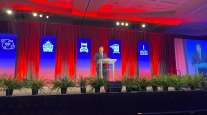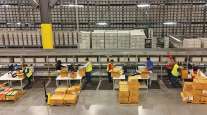Senior Reporter
Recession Coming in Q2 From Coronavirus Impact, Economists Say

[Stay on top of transportation news: Get TTNews in your inbox.]
The U.S. economy is rapidly moving from 121 consecutive months of growth to a recession, the result of consumers and businesses hitting the brakes over mounting fears of the coronavirus.
That’s the opinion of economists who watch the economy on an hour-by-hour basis and President Donald Trump.
FTR Transportation Intelligence is projecting that the economy will contract by 0.7% in the second quarter and by 1.2% in the third.
A recession is technically defined as two consecutive quarters of negative gross domestic product growth.

Vise
FTR Vice President Avery Vise told Transport Topics if companies can resume limited business this spring and damage to the economy does not last into the fall, this could be what’s called a V recession, which is a steep drop in GDP, followed by a rapid recovery.
THE CRISIS IN PHOTOS: Impact of the spread of the coronavirus
FTR said if that’s the case, the fourth quarter could see a sharp rebound and 3.5% GDP growth as consumers and businesses begin to spend because of the pent-up demand for goods and services that typically happens during a recession.
“It’s not looking like a good couple of quarters here,” Vise said. “There will be a recession. It will be very painful for two quarters, but then we’re back in a growth environment. It’s not the kind of decline we saw in the great recession, and it is also not the kind of duration, certainly is not as long.”
But Vise said FTR is basing its projects on a best-case scenario, and the economic damage could be worse, depending on how much the virus spreads.
“We’re looking at this not even beginning to recover, until late May, assuming we do contain the virus. If we do not contain the virus, these numbers are probably on the optimistic side,” he said.
For the trucking industry, Vise said the past several weeks have seen a boom as millions of Americans have rushed to stores to purchase groceries and other critical supplies in anticipation of staying close to home for several weeks. Across the country, hundreds of thousands of drivers are picking up loads at warehouses and resupplying stores.
“In the next several weeks, it’s going to be a very busy time for trucking,” Vise said. “The market was already tightening, the spot market was tightening, and we’re going to put a lot of stress on trucking in the next two or three weeks.”
But then things likely will slow down as the number of imported goods from China, South Korea and other nations drops. Factories and other manufacturing facilities in those nations are just getting back online as Asian countries had the coronavirus first, ahead of the U.S., and those economies have taken a direct hit.
As an example, the Port of Los Angeles, the nation’s busiest, reported March 10 that container volume for February was down nearly 23% as 544,037 industry-standard 20-foot equivalent units were processed compared with 705,306 TEUs in 2019.
Los Angeles’ neighbor, the Port of Long Beach, saw a 9.7% year-over-year drop, reporting it processed 538,428 TEUs in February compared with 596,616 in 2019.
Several other ports also reported declines in February.
ATA Chief Economist Bob Costello said if there is a bright side, it is that the economy was continuing to grow before the coronavirus outbreak hit.

Costello
“I think it will be very difficult to avoid contraction in Q2,” he said. “And based on what is going on in China and Europe, as in a prolonged crisis, it looks more and more difficult to avoid a recession. But it is too early for me to make that call. The more places that go into ‘lockdown,’ the more likely a contraction becomes.”
On March 16, Trump acknowledged the economy was slowing when a reporter asked if the economy is in a recession.
“It may be,” the president said. “I don’t, No. 1, determine recession,” Trump said. “I just say this: We have an invisible enemy. We have a problem that, a month ago, nobody ever thought about.”
Rajeev Dhawan, director of the Economic Forecasting Center at Georgia State University, believes the FTR Transportation Intelligence forecast is accurate. Still, it may be overly optimistic, and his research shows the recession could be deeper.
“The damage to the financial side, if this lasts until summer, will be too much to give you a rebound from pent-up demand,” Dhawan said. “The way the Federal Reserve cut interest rates [March 15] tells you the financial problems are already here.”
The Fed cut interest rates to zero, and it announced it would buy at least $700 billion in government and mortgage-related bonds as part of a wide-ranging emergency action to protect the economy.
“Things are much worse than the naked eye tells you on the financial side,” Dhawan said.
Want more news? Listen to today's daily briefing:




